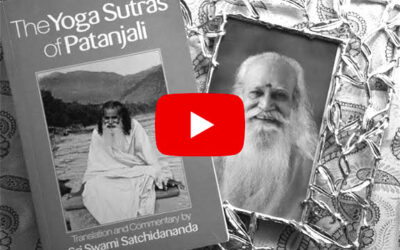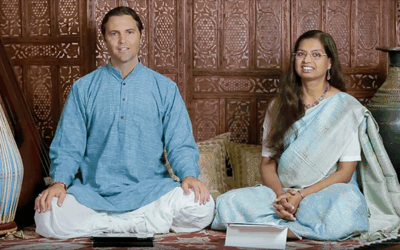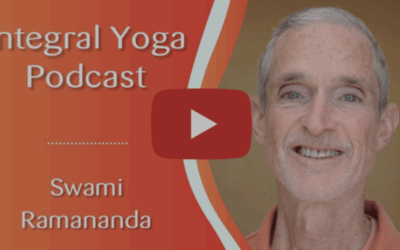Thanksgiving, a special time when we give thanks. It's the perfect time to reflect on how we can put gratitude and compassion into action. As we make our way through the month of November, we can return to the following practice as a tool to deepen your capacity for...
Ahimsa As a Gift
Ahimsa is a Sanskrit word that translates as “without injury” or “nonviolence” in English. It’s a principle in Hindu, Buddhist, and Jainist philosophy that involves causing the least amount of harm possible to all beings. It’s the first ethical principle given as a...
From Clouds to Clear Sky: Transformation Through Yoga
If you deny thoughts and emotions or try to get rid of them by suppressing them they will just reemerge. When negative thoughts come there are three things you can do. You can ignore them the same way that the blue sky ignores the gray clouds that appear in it. The...
Swami Sivananda’s Sampoorna Yoga for Modern Seekers
If you asked Sri Swami Sivananda what a busy person in the West should actually do each day to grow spiritually, he would likely point you to a deceptively simple framework: do a little meditation, a little prayer, a little study, a little service—every day—with...
How to Control Thoughts and Stop Vasanas?
In this short video, Swami Ramanacharana Tirtha answers this question. Sri Swamiji is an Acharya of Vedānta sampradāya. His discourses and writings are filled with the power of Atmajñāna and the fragrance of bhakti and one gets an intimation of one’s spiritual essence...
How to Practice Viveka
Viveka is the spiritual practice of discrimination—distinguishing between the real and unreal, the eternal and temporary, the Spiritual Presence and ego-identity. Here are some ways to put viveka into practice. See which of these resonates with you and supports you to...
The Greatest Victory
Gurudev Sivanandaji used to say that we should watch our thoughts because they create habits. Once you develop a habit, it becomes your character. And then your character becomes your destiny. So, it all originates with your thinking. That is why it is so important to...
Be Unshakeable
When you make a spiritual commitment—what kind of commitment is it? And why do you make it? A spiritual commitment doesn’t have to be to become a swami, a minister. Particularly in the spiritual field, what are you committed to? Not to an organization or an ashram,...
Krishna Das: Presence, Practice, and Letting Go of Ego
In this profound podcast episode, Krishna Das, the renowned kirtan singer, sits down with Integral Yoga Teachers Association director Avi Gordon to share insights on navigating the subjective nature of reality, the power of spiritual practice, and the art of letting...
To Have or Have Not? Aparigraha: Non-Possessiveness
“Possession are okay, as long as you possess them, and you don’t allow them to possess you.” ~Sri Swami Satchidananda It’s ironic how as youngsters all we want to do is play with our toys. As children, we must learn to share at home with our siblings and at school...
Serving a Higher Will
When we strive to see ourselves as instruments of a Higher Will—the hands of God at work in the world—we access and allow ourselves to be guided by a concern for the well-being of everyone. We more easily let go of our personal desires without force or denial and find...
Yoga Sutras of Patanjali Video Series
Join Integral Yoga Master Teacher Nalanie Chellaram as she teaches the Yoga Sutras of Patanjali. The series begins with an overview of the text and why it is such an inspiration to so many. Utilizing the commentaries by Swami Satchidananda, along with insights from...
The Art and Science of Sacred Chanting
Thousands of years ago the rishi (seers) of ancient India created a culture wherein religion, art and science thrived in harmony. Music was known to be a divine art interwoven with the sciences of sound, psychology and mathematics. It was partially intended for...
Beyond the Meditation Cushion
The great South Indian sage Thiruvalluvar said, “What is tapasya (penance)?” Tapasya doesn’t mean go and close your eyes and meditate. That’s easy, comfortable. Tapas means to burn. A spiritual seeker is supposed to practice tapasya. Thiruvalluvar says, “The more you...
Finding Peace in Chaos
In this inspiring conversation led by host Avi Gordon (director of the Integral Yoga Teachers Association), Swami Ramananda (president of the Integral Yoga Institute of San Francisco) shares profound insights on finding peace in chaotic times through spiritual...
Yoga Adventures for Little Explorers
In their new book Yoga Adventures for Little Explorers, author Megan McDougall and illustrator Hayley Lowe share their love of teaching Yoga to young ones! This little book will bring children on a journey with meditation, breath, work and flow. Yoga Adventures sets...
















